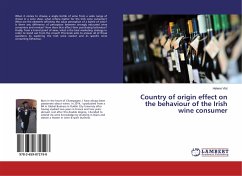
The effects of national stereotypes on COO-based product evaluations
A conceptual model and experimental investigation
Versandkostenfrei!
Versandfertig in 6-10 Tagen
39,99 €
inkl. MwSt.

PAYBACK Punkte
20 °P sammeln!
This dissertation studies the relation between country of origin-based consumer evaluations of the hedonic and utilitarian dimensions of product attitudes and the two dimensions of national stereotype contents perceived warmth and perceived competence.Specifically, the conceptual model proposes that the perceived competence dimension interacts with the utilitarian dimension, while the perceived warmth dimension interacts with the hedonic dimension, to produce a stronger effect on product evaluation. A between-subjects experimental study was used to test the conceptual model.The empirical resul...
This dissertation studies the relation between
country of origin-based consumer evaluations of the
hedonic and utilitarian dimensions of product
attitudes and the two dimensions of national
stereotype contents perceived warmth and perceived
competence.
Specifically, the conceptual model proposes that the
perceived competence dimension interacts with the
utilitarian dimension, while the perceived warmth
dimension interacts with the hedonic dimension, to
produce a stronger effect on product evaluation.
A between-subjects experimental study was used to
test the conceptual model.
The empirical results support the proposed
interaction between perceived competence and
utilitarian attitudes, but not between perceived
warmth and hedonic attitudes. Furthermore,
familiarity with a country s products was observed
to have an independent, rather than moderating,
effect on product evaluation.
The research and managerial implications are
discussed, particularly for the marketing strategies
of nations as brands.
country of origin-based consumer evaluations of the
hedonic and utilitarian dimensions of product
attitudes and the two dimensions of national
stereotype contents perceived warmth and perceived
competence.
Specifically, the conceptual model proposes that the
perceived competence dimension interacts with the
utilitarian dimension, while the perceived warmth
dimension interacts with the hedonic dimension, to
produce a stronger effect on product evaluation.
A between-subjects experimental study was used to
test the conceptual model.
The empirical results support the proposed
interaction between perceived competence and
utilitarian attitudes, but not between perceived
warmth and hedonic attitudes. Furthermore,
familiarity with a country s products was observed
to have an independent, rather than moderating,
effect on product evaluation.
The research and managerial implications are
discussed, particularly for the marketing strategies
of nations as brands.












